| Entry | Database: PDB / ID: 6y95
|
|---|
| Title | Ca2+-free Calmodulin mutant N53I |
|---|
 Components Components | Calmodulin |
|---|
 Keywords Keywords | METAL BINDING PROTEIN / Mutant / metal-binding / signaling protein / CPVT |
|---|
| Function / homology |  Function and homology information Function and homology information
CaM pathway / Cam-PDE 1 activation / Sodium/Calcium exchangers / Calmodulin induced events / Reduction of cytosolic Ca++ levels / Activation of Ca-permeable Kainate Receptor / CREB1 phosphorylation through the activation of CaMKII/CaMKK/CaMKIV cascasde / Loss of phosphorylation of MECP2 at T308 / CREB1 phosphorylation through the activation of Adenylate Cyclase / negative regulation of high voltage-gated calcium channel activity ...CaM pathway / Cam-PDE 1 activation / Sodium/Calcium exchangers / Calmodulin induced events / Reduction of cytosolic Ca++ levels / Activation of Ca-permeable Kainate Receptor / CREB1 phosphorylation through the activation of CaMKII/CaMKK/CaMKIV cascasde / Loss of phosphorylation of MECP2 at T308 / CREB1 phosphorylation through the activation of Adenylate Cyclase / negative regulation of high voltage-gated calcium channel activity / PKA activation / CaMK IV-mediated phosphorylation of CREB / Glycogen breakdown (glycogenolysis) / CLEC7A (Dectin-1) induces NFAT activation / Activation of RAC1 downstream of NMDARs / negative regulation of ryanodine-sensitive calcium-release channel activity / organelle localization by membrane tethering / mitochondrion-endoplasmic reticulum membrane tethering / autophagosome membrane docking / negative regulation of calcium ion export across plasma membrane / regulation of cardiac muscle cell action potential / presynaptic endocytosis / Synthesis of IP3 and IP4 in the cytosol / regulation of cell communication by electrical coupling involved in cardiac conduction / Phase 0 - rapid depolarisation / calcineurin-mediated signaling / Negative regulation of NMDA receptor-mediated neuronal transmission / Unblocking of NMDA receptors, glutamate binding and activation / RHO GTPases activate PAKs / Ion transport by P-type ATPases / Uptake and function of anthrax toxins / regulation of ryanodine-sensitive calcium-release channel activity / Long-term potentiation / protein phosphatase activator activity / Calcineurin activates NFAT / Regulation of MECP2 expression and activity / DARPP-32 events / Smooth Muscle Contraction / detection of calcium ion / regulation of cardiac muscle contraction / catalytic complex / RHO GTPases activate IQGAPs / regulation of cardiac muscle contraction by regulation of the release of sequestered calcium ion / calcium channel inhibitor activity / Activation of AMPK downstream of NMDARs / presynaptic cytosol / cellular response to interferon-beta / Protein methylation / regulation of release of sequestered calcium ion into cytosol by sarcoplasmic reticulum / eNOS activation / titin binding / Ion homeostasis / Tetrahydrobiopterin (BH4) synthesis, recycling, salvage and regulation / regulation of calcium-mediated signaling / sperm midpiece / voltage-gated potassium channel complex / FCERI mediated Ca+2 mobilization / calcium channel complex / substantia nigra development / regulation of heart rate / Ras activation upon Ca2+ influx through NMDA receptor / FCGR3A-mediated IL10 synthesis / Antigen activates B Cell Receptor (BCR) leading to generation of second messengers / calyx of Held / adenylate cyclase activator activity / protein serine/threonine kinase activator activity / sarcomere / VEGFR2 mediated cell proliferation / VEGFR2 mediated vascular permeability / regulation of cytokinesis / spindle microtubule / positive regulation of receptor signaling pathway via JAK-STAT / Translocation of SLC2A4 (GLUT4) to the plasma membrane / calcium channel regulator activity / RAF activation / Transcriptional activation of mitochondrial biogenesis / response to calcium ion / cellular response to type II interferon / G2/M transition of mitotic cell cycle / Stimuli-sensing channels / long-term synaptic potentiation / spindle pole / Signaling by RAF1 mutants / calcium-dependent protein binding / Signaling by moderate kinase activity BRAF mutants / Paradoxical activation of RAF signaling by kinase inactive BRAF / Signaling downstream of RAS mutants / RAS processing / Signaling by BRAF and RAF1 fusions / Platelet degranulation / myelin sheath / Inactivation, recovery and regulation of the phototransduction cascade / RAF/MAP kinase cascade / Ca2+ pathway / High laminar flow shear stress activates signaling by PIEZO1 and PECAM1:CDH5:KDR in endothelial cells / vesicle / transmembrane transporter binding / Extra-nuclear estrogen signaling / G protein-coupled receptor signaling pathway / calcium ion bindingSimilarity search - Function EF-hand / : / Recoverin; domain 1 / EF-hand domain pair / EF-hand, calcium binding motif / EF-Hand 1, calcium-binding site / EF-hand calcium-binding domain. / EF-hand calcium-binding domain profile. / EF-hand domain / EF-hand domain pair ...EF-hand / : / Recoverin; domain 1 / EF-hand domain pair / EF-hand, calcium binding motif / EF-Hand 1, calcium-binding site / EF-hand calcium-binding domain. / EF-hand calcium-binding domain profile. / EF-hand domain / EF-hand domain pair / Orthogonal Bundle / Mainly AlphaSimilarity search - Domain/homology |
|---|
| Biological species |  Homo sapiens (human) Homo sapiens (human) |
|---|
| Method | SOLUTION NMR / simulated annealing |
|---|
 Authors Authors | Holt, C. / Hamborg, L.N. / Lau, K. / Brohus, M. / Sorensen, A.B. / Larsen, K.T. / Sommer, C. / Petegem, F.V. / Overgaard, M.T. / Wimmer, R. |
|---|
| Funding support |  Denmark, European Union, 6items Denmark, European Union, 6items | Organization | Grant number | Country |
|---|
| Danish Council for Independent Research | DFF-1323-00344 |  Denmark Denmark | | Novo Nordisk Foundation | NNF18OC0053032 |  Denmark Denmark | | The Carlsberg Foundation | |  Denmark Denmark | | European Union (EU) | 261863 | European Union | | The SparNord foundation | |  Denmark Denmark | | The Obel Family foundation | |  Denmark Denmark |
|
|---|
 Citation Citation |  Journal: J.Biol.Chem. / Year: 2020 Journal: J.Biol.Chem. / Year: 2020
Title: The arrhythmogenic N53I variant subtly changes the structure and dynamics in the calmodulin N-terminal domain, altering its interaction with the cardiac ryanodine receptor.
Authors: Holt, C. / Hamborg, L. / Lau, K. / Brohus, M. / Sorensen, A.B. / Larsen, K.T. / Sommer, C. / Van Petegem, F. / Overgaard, M.T. / Wimmer, R. |
|---|
| History | | Deposition | Mar 6, 2020 | Deposition site: PDBE / Processing site: PDBE |
|---|
| Revision 1.0 | Apr 29, 2020 | Provider: repository / Type: Initial release |
|---|
| Revision 1.1 | May 6, 2020 | Group: Database references / Category: citation / citation_author
Item: _citation.pdbx_database_id_DOI / _citation.pdbx_database_id_PubMed ..._citation.pdbx_database_id_DOI / _citation.pdbx_database_id_PubMed / _citation.title / _citation_author.identifier_ORCID / _citation_author.name |
|---|
| Revision 1.2 | Jun 10, 2020 | Group: Database references / Category: citation / citation_author
Item: _citation.journal_volume / _citation.page_first ..._citation.journal_volume / _citation.page_first / _citation.page_last / _citation.title / _citation_author.identifier_ORCID |
|---|
| Revision 1.3 | Jun 14, 2023 | Group: Database references / Other / Category: database_2 / pdbx_database_status
Item: _database_2.pdbx_DOI / _database_2.pdbx_database_accession / _pdbx_database_status.status_code_nmr_data |
|---|
| Revision 1.4 | Jun 19, 2024 | Group: Data collection / Database references / Category: chem_comp_atom / chem_comp_bond / database_2 / Item: _database_2.pdbx_DOI |
|---|
|
|---|
 Open data
Open data Basic information
Basic information Components
Components Keywords
Keywords Function and homology information
Function and homology information Homo sapiens (human)
Homo sapiens (human) Authors
Authors Denmark, European Union, 6items
Denmark, European Union, 6items  Citation
Citation Journal: J.Biol.Chem. / Year: 2020
Journal: J.Biol.Chem. / Year: 2020 Structure visualization
Structure visualization Molmil
Molmil Jmol/JSmol
Jmol/JSmol Downloads & links
Downloads & links Download
Download 6y95.cif.gz
6y95.cif.gz PDBx/mmCIF format
PDBx/mmCIF format pdb6y95.ent.gz
pdb6y95.ent.gz PDB format
PDB format 6y95.json.gz
6y95.json.gz PDBx/mmJSON format
PDBx/mmJSON format Other downloads
Other downloads https://data.pdbj.org/pub/pdb/validation_reports/y9/6y95
https://data.pdbj.org/pub/pdb/validation_reports/y9/6y95 ftp://data.pdbj.org/pub/pdb/validation_reports/y9/6y95
ftp://data.pdbj.org/pub/pdb/validation_reports/y9/6y95

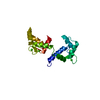
 Links
Links Assembly
Assembly
 Components
Components Homo sapiens (human) / Gene: CALM1, CALM, CAM, CAM1 / Production host:
Homo sapiens (human) / Gene: CALM1, CALM, CAM, CAM1 / Production host: 
 Sample preparation
Sample preparation Movie
Movie Controller
Controller



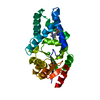
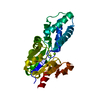
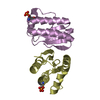


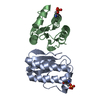
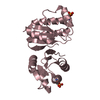
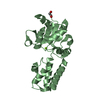
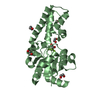
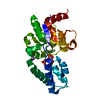
 PDBj
PDBj







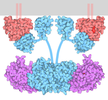

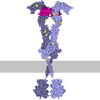
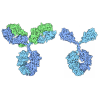

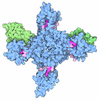
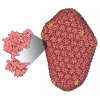


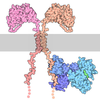

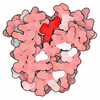

 HSQC
HSQC